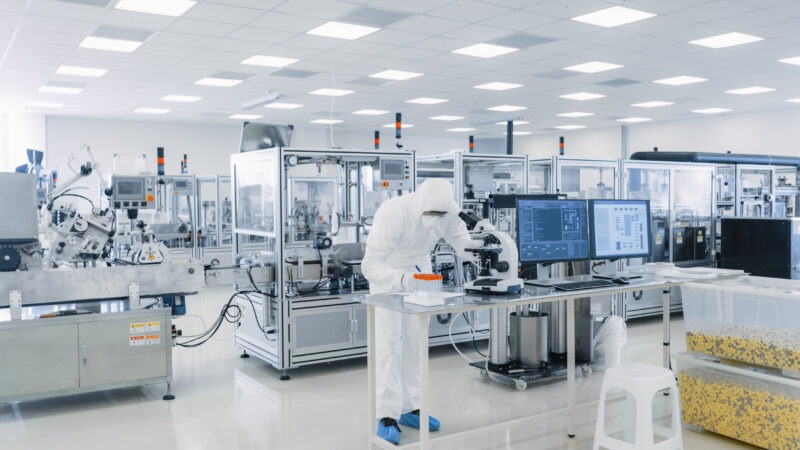The CDMO/CMO Report: High-Potency API Manufacturing
Driven by growth in the oncology drug sector, high-potency active pharmaceutical ingredient (HPAPI) manufacturing continues to be an active area of investment by CDMOs/CMOs. Which companies are expanding? DCAT Value Chain Insights rounds up the latest expansions in HPAPI manufacturing.
Rounding up recent investments
A roundup of recent investments by CDMOs/CMOs in high-potency active pharmaceutical ingredients (HPAPIs) is outlined below.
WuXi STA. WuXi STA, a CDMO of APIs and drug products and a subsidiary of WuXi AppTec, opened in 2022 a HPAPI plant at its site in Changzhou, Jiangsu Province, China. The new plant consists of reactors from 250 L to 3,000 L, prep-HPLC systems, a 10-m2 tray lyophilizer, and flow-chemistry and milling technologies with capability to handle potent compounds with occupational exposure limits as low as 10 ng/m3. WuXi STA has two sites in China, Shanghai Jinshan and Changzhou, to support the process development and manufacture of HPAPIs. In addition to HPAPIs, the Changzhou site provides process development and manufacturing for linkers, oligonucleotides, and peptides.
MilliporeSigma. MilliporeSigma, the life-science business of Merck KGaA, opened in July 2022 a new $65-million, 70,000-square-foot HPAPI manufacturing facility in Verona, Wisconsin. The new facility doubles the company’s HPAPI manufacturing capacity. The facility joins the company’s facility in St. Louis, Missouri, which specializes in antibody-drug conjugate (ADC) bio-conjugation, APIs, excipients, and adjuvants manufacturing. In addition, the company announced in November 2021 an expansion of antibody drug conjugate (ADC) capabilities at is clinical manufacturing facility in St. Louis to provide a larger footprint to enable large-scale production, including chromatographic purification for early-phase clinical supply.
Piramal Pharma Solutions. Piramal Pharma Solutions opened in 2022 a new API manufacturing plant at its site in Aurora, Ontario, Canada, which includes HPAPI capabilities. The new plant, built as part of a CAD $30-million (US$23-million) capital investment, has more than 10,000 square feet of new manufacturing space and includes two new reactor suites with additional filtration and drying capabilities. It also expands the company’s ability to produce clinical to commercial-scale APIs, including HPAPIs requiring an occupational exposure limit (OEL) of 1 mcg/m3.
In addition, Piramal advanced a $32-million expansion at its site in Riverview, Michigan, for API development and manufacturing. The expansion consists of more than 25,000 square feet to include additional large-scale manufacturing, kilo labs, and process development capacity. Facility design procedures includes controlled-room pressurizations with air locks, glovebox technology/contained systems for charging and discharging potent compounds.
The company is also expanding ADC capabilities at its facility in Grangemouth, Scotland. In the first phase of the Grangemouth site expansion, two new ADC manufacturing suites will be added and are slated to be operational by the third quarter of 2023. The building was designed to accommodate further expansion, with planned future phases that include a new sterile fill–finish suite dedicated to ADCs and two additional large-scale manufacturing suites capable of handling increased batch sizes.
Cambrex. Cambrex completed in 2022 a $50-million expansion of its large-scale API manufacturing capabilities at its facility in Charles City, Iowa. The start-up of the new manufacturing space is the culmination of a two-year project, originally announced in 2020, to increase the capacity of the facility by 30%. Following the expansion, the facility has approximately 400 employees and an installed reactor capacity of over 25,000 gallons. The facility is located on a 45-acre property and produces APIs and pharmaceutical intermediates, including highly potent molecules and controlled substances.
In addition to its expansion in Iowa, Cambrex invested in additional small- and mid-scale API manufacturing capacity at its facilities in Karlskoga, Sweden, and High Point, North Carolina. New capacity at those facilities was slated to come on line in late 2022 and mid-2023, respectively. A $30-million expansion in its High Point, North Carolina, facility approximately doubles the facility’s capacity by adding new chemistry laboratories, new clinical manufacturing suites, and a small-scale commercial manufacturing operation with reactors up to 2,000 liters. In addition to expanding capabilities in continuous flow chemistry, the investment gives Cambrex the ability to develop and manufacture HPAPIs at the facility.
HAS Healthcare Advanced Synthesis. HAS Healthcare Advanced Synthesis (formerly Helsinn Advanced Synthesis) has progressed a multi-year expansion for HPAPIs. A investment of CHF 20 million ($22 million) in 2012 to 2014 was for a dedicated anticancer facility (Synthesis C) with three production bays ranging from 20 L to 800 L down to an occupational exposure limit of 50 ng/m³ in batch sizes ranging from 1 to 30 kg per batch. In 2019, this facility was expanded with a CHF 16.5-million ($17.9-million) investment to add a larger production bay with 800-L, 1000-L, and 1,200-L reactors, allowing for up to 40 kg per batch. At the same time, the company’s R&D and quality control (QC) lab capacity was doubled. With an ongoing investment of CHF 8 million ($8.7 million) for a new QC Laboratory Center, building construction began in 2022, and completion is slated for this year (2023). In 2022, the company initiated a CHF 70-million ($76-million) expansion (Synthesis D), which will have three different HPAPI bays to offer additional capacity.
AGC Fine Chemicals. AGC Fine Chemicals, a Tokyo, Japan-based manufacturer of glass, chemicals, and high-tech materials, is investing $100 million to expand AGC Pharma Chemicals Europe, an AGC subsidiary and synthetic pharmaceutical CDMO. A new building with a total floor area of 7,500 m2 will be constructed on the company’s site to increase current production capacity by 30%. The expansion will include the introduction of facilities for HPAPIs. The new facility is scheduled to start operation in the first half of 2024.
Lonza. Last month (June 2023), Lonza acquired Synaffix, an Oss, Noord-Brabant, the Netherlands-based biotechnology company focused on developing ADCs, in a deal worth up to $171 million (EUR 100 million [$107 million] upfront and EUR 60 million [$64 million] in milestone payments). Synaffix has a technology platform that includes payload and site-specific linker technologies, which will add to Lonza’s ADC services, including its early-phase offering.
Also, earlier this year (2023), Lonza completed an expansion of its bioconjugation facility in Visp, Switzerland. The expansion includes two manufacturing suites and supporting infrastructure, including development and manufacturing capacity for pre-clinical, clinical and commercial supply of bioconjugates and ADCs.
In 2022, Lonza completed an expansion of its HPAPI multipurpose manufacturing suite at its site in Visp, Switzerland. In addition, as part of a CHF-20 million ($22-million) expansion of its API manufacturing center in Nansha, China, Lonza added laboratories to develop and manufacture HPAPIs.
Polpharma API. Polpharma API, a Starogard Gdanski, Poland-based CDMO, is investing in a new R&D & production facility for HPAPIs. Completion is scheduled for the first quarter of 2024. It will include separate process laboratories, analytical laboratories for quality-control analyses, and a GMP kilo-lab production line with volume up to 1.5 kg with potential for volume increases.m,
Carbogen Amcis. Carbogen Amcis recently invested CHF 15-million ($16-million) in a jointly funded project with an undisclosed Japan-based customer to expand its site in Bubendorf, Switzerland, to produce exclusively for the signatory customer a complex HPAPI for a commercial ADC.
Sterling Pharma Solutions. Earlier this year (2023), Sterling Pharma Solutions completed its acquisition of an API manufacturing facility in Ringaskiddy, Ireland, from Novartis. The 111-acre site includes multiple commercial-scale production buildings, with a total vessel capacity of 175 cubic meters across over 30 reactor trains, a small-scale facility, and a development and support building housing 14 development and analytical laboratories. The facility also includes capabilities for HPAPIs, solid-phase and agitated vessels for peptide coupling and synthesis, as well as various milling and micronization equipment for drug-substance processing.
Also, earlier this year (2023), the Medicines and Healthcare products Regulatory Agency (MHRA), the UK’s pharmaceutical regulatory authority, granted manufacturer’s authorization for investigational medicinal products to allow Sterling to manufacture ADCs for clinical use in its cGMP manufacturing facility in Deeside, UK.
Sterling acquired the 6,500-square-meter site as part of its purchase of ADC Biotechnology in April 2021, and has since gone on to invest in expanding the facility to develop its scientific and analytical teams, install a new water-for-injection plant, and establish bioconjugation and ADC manufacturing capabilities. The license allows for GMP bulk drug-substance manufacture to support all phases of clinical studies, GMP release testing, and stability studies. The site will work in parallel with Sterling’s facility in Germantown, Wisconsin, which provides services to develop and manufacture highly potent small molecules that make up part of an ADC drug molecule.
Ajinomoto Bio-Pharma Services. Ajinomoto Bio-Pharma Services expanded its small-molecule manufacturing capabilities with the addition of a new production facility in Visakhapatnam, India. The new small-molecule manufacturing facility doubles the production capacity at the site to 310 cubic meters for APIs and intermediates and has dedicated equipment to manage Occupational Exposure Band Level 4 high-potency ingredients.
Axplora (formerly Novasep-PharmaZell). Axplora (formlery Novasep-PharmaZell) invested a total of EUR 51 million ($55 million) at four of Novasep’s European sites, located in France and in Germany, for API development and manufacturing. These investments, which were completed in 2022 and slated for 2023, include the modernization and addition of new API manufacturing workshops, the extension of clinical and commercial HPAPI capabilities, including ADC payloads and the addition of cGMP pilot-scale flow-chemistry capability. Novasep-PharmaZell was formed in 2022 following the merger of the two companies, Novasep and PharmaZell, both CDMOs of APIs; the combined company was later renamed Axplora.
In 2022, the company began a EUR 7.3-million ($7.4-million) investment to expand its Mourenx, France, site to create a multi-purpose pilot workshop within one of its production units. The investment includes an upgrade of two existing 2,000-liter reactors and the addition of a new 1,500-liter reactor and Hastelloy filter-dryer. The new multi-purpose workshop is equipped to produce batches ranging from 30 kg to 100 kg for clinical trials, process validation, and commercial production of active pharmaceutical ingredients (APIs) for targeted therapies, with a focus on HPAPIs.
Olon. Earlier this year (May 2023), Olon started the construction of a new facility at its site in Rodano, Milan, Italy, which will be dedicated to managing and producing ultra-potent compounds used as payloads and payload-linkers for antibody-drug conjugates (ADCs). Olon is investing EUR 22 million ($23.5 million) in the new facility. Upon construction of the new building, a second shell will be built containing the production facility and the quality control and research and development areas as well as all auxiliary facilities. This complete, closed-loop system will include all steps of the process: synthesis, isolation, drying and analysis, and the ultra-high-containment plant. The first phase of the construction, to build the payload research and development area, has begun and is expected to be completed by the first half of 2024. Once completed, the company will move on to the second stage of finalizing the production line by creating the quality control and GMP production areas, with the installation of industrial production equipment.
Also, earlier this year (2023), Olon completed an investment in its facility in Rodano, Italy, to expand pilot-plant capacity for scaling up HPAPIs up to a level of containment of OEB5 (1-0.1 ug/m3). Olon is supported by other pilot plants in its network for the development of HPAPIs, such as its site in Segrate, Italy, with which the Rodano plant will be integrated for increased capacity and improved flexibility.
Last year (2022), Olon announced an investment of EUR 27 million ($30 million) in 2022/2023 to expand internal expertise and capacity for high-containment manufacturing. In addition, in September 2022, the company began an expansion of its Mahad, India, manufacturing site, to install a new high-containment production line for containing and handling substances up to level OEB4 (up to 1µg/m3). The new line will be suitable for producing medium-volume batches.
Cerbios-Pharma. Cerbios Pharma, a Lugano, Switzerland-based CDMO, is expanding with a new manufacturing building dedicated to HPAPIs, to host two additional cGMP production lines for cytotoxic molecules and additional space for dedicated R&D and quality control labs. The new cGMP unit (SafeBridge Category 4) was slated to be operative in the second quarter of 2023 and will host production ranging from 200 mg to 2 kg per batch.
In 2021, Cerobis-Pharma received approval from Swissmedic, the national pharmaceutical regulatory agency in Switzerland, for the company’s new HPAPI production plant, which allows for occupational exposure limits up to 30 ng/m3 and enables manufacture up to 35-kg batch size. The plant features reactors up to 1,000 L and a pressure-filter-dryer.
Formosa Laboratories. Formosa Laboratories, a Taoyuan, Taiwan-based CDMO of APIs, ADCs and injectables, is investing $20 million to expand its API manufacturing facility to build up its bioconjugation ADC platform, a peptide-generation system for personalized medicine production, and a microfluidic synthesis system at its facility in Taiwan. The expansion began in January 2022 and is expected to be completed in 2023.
Sai Life Sciences. Earlier this year (2023), SAI Life Sciences opened a new HPAPI manufacturing facility at its cGMP API manufacturing campus in Bidar, India. The new 16,000-square-foot HPAPI facility can handle HPAPIs with less than 1 μg/m3 containment. It also includes the following: a warehouse to store key starting materials, intermediates and finished goods; a dedicated sampling/dispensing area with isolators with three independent streams to handle commercial-scale batches; reactors to handle multiple unit operations equipped with isolators and split butterfly valves; powder processing and a packing area with isolators; dedicated isolator train for quality control testing, and a deactivation facility. Earlier in 2022, the company opened an HPAPI development facility at its Hyderabad, India, R&D campus.
Procos. Procos, a Cameri, Italy-based CDMO, is investing EUR 17 million ($19 million) to expand its existing HPAPI manufacturing facility by adding two new cGMP small-scale and milling units. After several successful years of involvement in the HPAPI business, which started in 2018, the company is now investing an additional EUR 17 million ($19 million) to create more capacity for the containment level with an occupational exposure limit of 10ng/m3 and to add new technologies in this area, such as chromatographic purification, nanofiltration systems, and freeze dryers.
Seqens. Seqens is proceeding with an expansion at the company’s site in Aramon, France, to build a new multi-tonnage production line for HPAPIs. The EUR-26 million ($28-million) investment will allow this new unit to deliver 10 T/year of HPAPIs. Completion is scheduled for the end of 2023.
In 2020, Seqens inaugurated a HPAPI manufacturing unit at its site in Villeneuve-La-Garenne, France, with an investment of EUR 30 million ($35 million).
Note: currency conversions are as of the time of the announced expansion.





